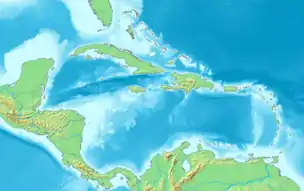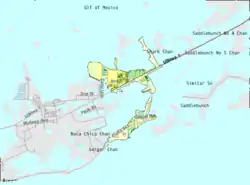Big Coppitt Key
Big Coppitt Key is an island in Monroe County, Florida, United States, in the lower Florida Keys.[1][2] The name is said to be a derivation of the old English word "coppice", meaning thicket. According to A.D. Bache, in the notes for his coast survey conducted in 1861, this key was the location of Happy Jack's plantation in 1855.[3]
 Big Coppitt Key, as seen northbound on U.S. 1 | |
 Big Coppitt Key Big Coppitt Key  Big Coppitt Key Big Coppitt Key (Caribbean) | |
| Geography | |
|---|---|
| Location | Gulf of Mexico |
| Coordinates | 24°35′52″N 81°39′24″W |
| Archipelago | Florida Keys |
| Adjacent to | Florida Straits |
| Administration | |
| State | Florida |
| County | Monroe |
Geography
Big Coppitt Key is located at 24°35′52″N 81°39′24″W (24.597677, -81.656546).[4]
U.S. 1 (the Overseas Highway) crosses the key at approximately mile markers 9.5-11, between East Rockland Key and the Saddlebunch Keys.
About the island
There are several businesses on Big Coppitt Key. There is also a Monroe County Fire/Rescue Station located on the island. Law enforcement services are handled by the Monroe County Sheriff's Office. There are three churches located on Big Coppitt Key. The key features three parks, including one with a playground and another with a basketball court, in the avenues section. A cemetery is located at Avenue A and 4th Street.
In 2005, Hurricane Wilma caused catastrophic damage to the island; many structures were either destroyed or rendered almost uninhabitable due to flood damage.
More recently, in 2017, Hurricane Irma caused similarly catastrophic damage; most homes were left uninhabitable due to severe wind and water damage.[5] However, damage to the island's world-famous Bobalu's Southern Cafe was light because of proper preparation. They boarded up their windows and took in their outdoor furniture and signs, saving the landmark.
Big Coppitt Key, Florida
Big Coppitt Key, Florida | |
|---|---|
 Location in Monroe County and the state of Florida | |
 U.S. Census Bureau map showing CDP boundaries | |
| Coordinates: 24°35′52″N 81°39′24″W | |
| Country | United States |
| State | Florida |
| County | Monroe |
| Area | |
| • Total | 1.84 sq mi (4.77 km2) |
| • Land | 1.15 sq mi (2.99 km2) |
| • Water | 0.69 sq mi (1.78 km2) |
| Elevation | 3 ft (1 m) |
| Population | |
| • Total | 2,869 |
| • Density | 2,486.14/sq mi (960.06/km2) |
| Time zone | UTC-5 (Eastern (EST)) |
| • Summer (DST) | UTC-4 (EDT) |
| ZIP Code | 33040 (Key West) |
| FIPS code | 12-06350[8] |
| GNIS feature ID | 1867115[9] |
Big Coppitt Key is the name of a census-designated place and unincorporated community that occupies Big Coppitt Key and the neighboring islands of Geiger Key and Shark Key. As of the 2020 census, it had a population of 2,869.[7] According to the United States Census Bureau, the CDP has a total area of 1.84 square miles (4.8 km2), of which 1.15 square miles (3.0 km2) are land and 0.69 square miles (1.8 km2), or 37.38%, are water.[6]
Demographics
2020 census
| Race | Number | Percentage |
|---|---|---|
| White (non-Hispanic) | 1,829 | 63.75% |
| Black or African American (non-Hispanic) | 148 | 5.16% |
| Native American | 4 | 0.14% |
| Asian | 55 | 1.92% |
| Pacific Islander | 3 | 0.1% |
| Other/Mixed | 105 | 3.66% |
| Hispanic or Latino | 725 | 25.27% |
As of the 2020 United States census, there were 2,869 people, 1,082 households, and 617 families residing in the CDP.
2000 census
As of the census[8] of 2000, there were 2,595 people, 1,108 households, and 681 families residing in the CDP. The population density was 726.0/km2 (1,885.2/mi2). There were 1,332 housing units at an average density of 372.7/km2 (967.6/mi2). The racial makeup of the CDP was 92.91% White, 1.08% African American, 0.81% Native American, 1.46% Asian, 0.08% Pacific Islander, 1.04% from other races, and 2.62% from two or more races. Hispanic or Latino of any race were 16.76% of the population.
There were 1,108 households, out of which 24.2% had children under the age of 18 living with them, 46.4% were married couples living together, 7.9% had a female householder with no husband present, and 38.5% were non-families. 26.1% of all households were made up of individuals, and 6.6% had someone living alone who was 65 years of age or older. The average household size was 2.34 and the average family size was 2.77.
In the CDP, the population was spread out, with 19.3% under the age of 18, 5.9% from 18 to 24, 32.4% from 25 to 44, 30.8% from 45 to 64, and 11.5% who were 65 years of age or older. The median age was 41 years. For every 100 females there were 119.4 males. For every 100 females age 18 and over, there were 114.5 males.
The median income for a household in the CDP was $45,194, and the median income for a family was $49,783. Males had a median income of $31,915 versus $27,721 for females. The per capita income for the CDP was $24,022. About 6.1% of families and 8.6% of the population were below the poverty line, including 9.7% of those under age 18 and 7.5% of those age 65 or over.
References
- Embassy Cruising Guide Florida, 6th edition: Waterways of Florida's East Coast, Keys, Okeechobee, and West Coast to Mobile Bay, Alabama. Ebooks2go, Incorporated. 2015. p. 691. ISBN 978-0-7436-1141-1. Retrieved September 7, 2017.
- Philpott, D. (2006). Florida: The Keys. LANDMARK VISITORS GUIDE FLORIDA KEYS. Hunter Pub Incorporated. p. 68. ISBN 978-1-84306-210-3. Retrieved September 7, 2017.
- ""Key Names" Florida Keys Gazetteer". Archived from the original on September 13, 2007. Retrieved September 10, 2008.
- "US Gazetteer files: 2010, 2000, and 1990". United States Census Bureau. February 12, 2011. Retrieved April 23, 2011.
- "No Running Water in Key West; Irma Evacuees Return Home to Upper Keys | The Weather Channel - Articles from The Weather Channel | weather.com". The Weather Channel.
- "2022 U.S. Gazetteer Files: Florida". United States Census Bureau. Retrieved January 18, 2023.
- "P1. Race – Big Coppitt Key CDP, Florida: 2020 DEC Redistricting Data (PL 94-171)". U.S. Census Bureau. Retrieved January 18, 2023.
- "U.S. Census website". United States Census Bureau. Retrieved January 31, 2008.
- "US Board on Geographic Names". United States Geological Survey. October 25, 2007. Retrieved January 31, 2008.
- "CENSUS OF POPULATION AND HOUSING (1790-2000)". U.S. Census Bureau. Retrieved July 31, 2010.
- "Explore Census Data". data.census.gov. Retrieved January 4, 2022.
